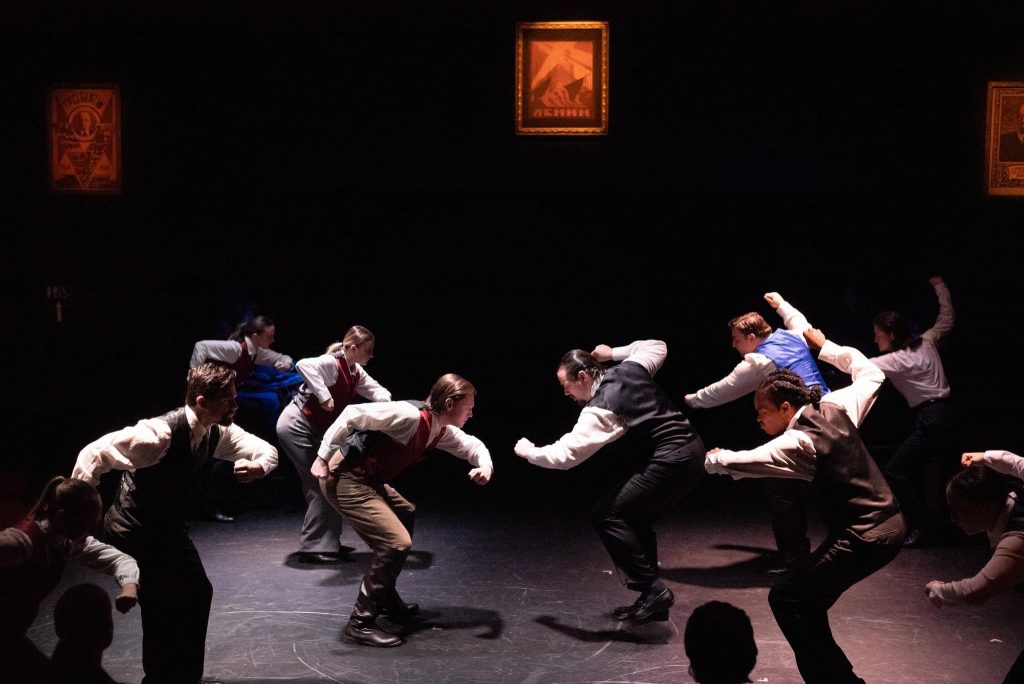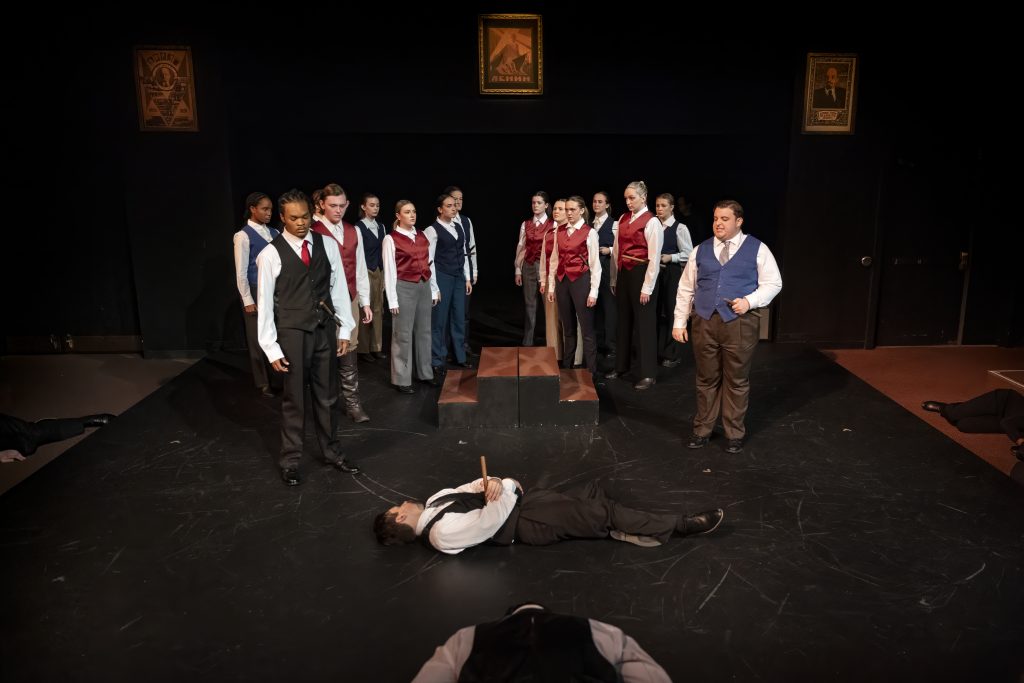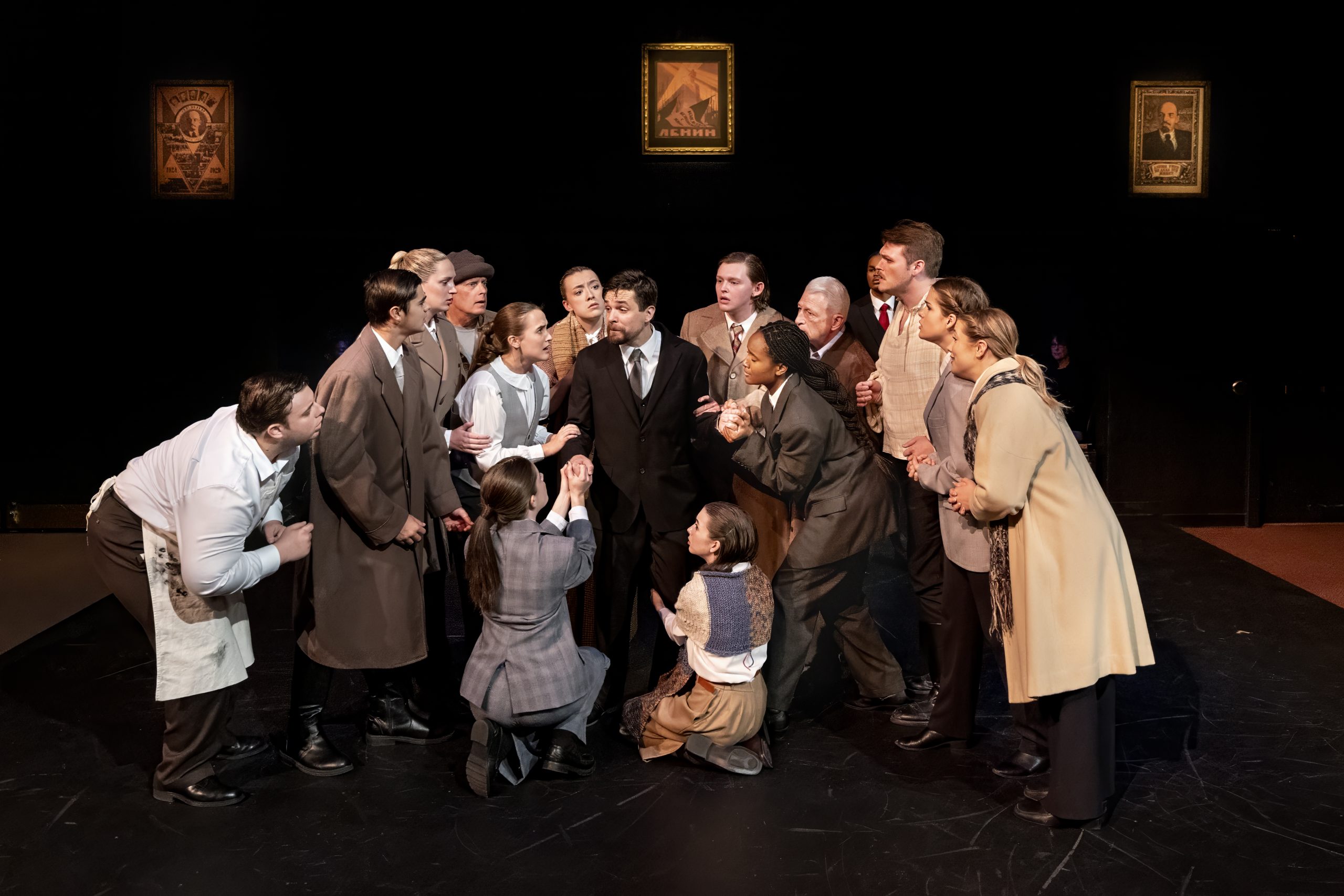Content warning: this article discusses self-harm, suicide, and violence.
Let’s start at the end: Brutus is on the verge of defeat at Philipi, Cassius is dead, Brutus is surrounded by his soldiers and attempts to persuade them to assist in his suicide. They all refuse and leave Brutus alone. Brutus calls out to a soldier and asks them to assist in a noble task. The soldier enters, but it is no soldier. Instead, it is the ghost of Julius Caesar. Caesar takes Brutus’s sword, fiercely looks him in the eye, and says, “Give me your hand first. Fare you well, my son.” Brutus falls on the sword held by the ghost and utters his last words: “Caesar, now be still. I killed not thee with half so good a will.”
The University of Alabama’s Theatre and Dance Department’s (UATD) recent production of Julius Caesar was not one to shy away from changing the text or rejecting traditional performance practices. There were no togas or swords to be seen here. Adapted (to a tidy ninety minutes) and directed by Seth Panitch, Julius Caesar was transplanted from ancient Rome to the early days of the Soviet Union. While the new setting was compelling given the current Russian war against Ukraine, it was in fact this final moment that was the most striking to me. The first time I saw this reveal—I attended twice in order to watch both casts—I actually gasped.
For context, in the text, Brutus’s death is not brought on (at least directly) by Caesar, but rather is assisted by a slave named Strato. The dialogue has also been altered from Strato referring to Brutus as “my lord” to Caesar’s address as “my son.” Yes, this is quite a daring change from the original text, but why is it so evocative? Throughout the play, audiences witnessed Brutus struggle with the moral implications of Caesar’s assassination. Not only is Brutus attempting to reconcile murder, but he is also attempting to reconcile with the murder of a friend and father-like figure. This dramaturgical change highlighted the central moral issue that Brutus grapples with throughout the play: when does the greater good outweigh love for a singular person?
This production of Julius Caesar is deeply invested in illustrating Brutus’s internal turmoil, which was emphasized in two ways. First, all of the dialogue and scenes focusing on commoners and exchange with the public were cut. This was a production that focused only on the most elite in society, as those who ruled were literally born into it. Second, was the addition of The Six, an ensemble of actors clad all in black that, through choreographed physical work, provided a reflection of the inner thoughts and feelings of the main players. Like all proper Shakespearean tragic heroes, Brutus must also have his ghosts. One striking moment when they appear is during Brutus’s contemplation of the assassination of Caesar. They surround him, hissing words from Brutus’s soliloquy and grabbing onto his body. Meanwhile, an ensemble of Taiko percussionists—a drumming style with roots in feudal Japan—contributed to the unsettling nature of the scene with eerie music. All of these additional elements create an aura of such great tension and suspense, shaping the death of Caesar into an inevitable and horrible outcome.

One of the arguments for Brutus’s nobility and integrity is his choice to do what he believes to be best for Rome despite his love for Caesar. In his speech to the plebeians after Caesar’s death, he justifies his decision, saying that the reason he killed Caesar was because, “not that I loved Caesar less, but that I loved Rome more.” The relationship between Brutus and Caesar is one with sparse information. Throughout the entirety of the play, they only exchange a handful of lines of dialogue and most of what is told about their relationship comes from Brutus after Caesar’s death. I have always found Brutus’s love for Caesar to be strange when Caesar is so often portrayed as an arrogant, unpredictable, and strong-willed tyrant. I can understand a love for Caesar, the great military leader, or for Caesar, the hero of Rome, but I have never understood the love for Caesar the person.
Perhaps there is some fraternal understanding—a boy’s club, if you will—between Brutus and Caesar that is imperceptible to a woman’s eye. Is there any difference between the bond between Brutus and Caesar than those found at the fraternity houses on the other end of the street from the Allen Bales Theater? This unknowable bond is only strengthened by the gender-bent casting of Cassius who seems to always be on the outside of their fraternal order. Furthermore, the ensemble of conspirators disguised themselves in headscarves when they meet with Brutus and Cassius which would indicate that they were also women—women with anonymous identities whose role is to serve Brutus. While Cassius may have recruited them, they are not there for her, but rather for a male leader to unite behind. Brutus is necessary to the conspiracy in part because of his gender. Despite the slicked-back hair, corporate suits, and an unmatched intensity from both of the actors who portrayed Cassius, she still appears as an outsider in comparison to the rest of the senators. She still thinks too much, a trait is accused of by Caesar, and so Brutus could never love her half as much as he loved Caesar.
The dissonance between Caesar the Leader and Caesar the Person is an issue to which the setting of the Russian revolution productively draws attention. The only adornments on the sparse stage are propagandic images of Lenin who looks, from above the action, down like a god observing his creations. Caesar, who wears an emblematic communist red tie, is positioned as a Lenin-like figure. After Caesar’s death, Mark Antony takes up red as his color, while the conspirators wear blue evocative of our own national elections coming up in the next year in the US. Only Brutus remains in a neutral grey suit throughout the production.
These subtle nods and references to Soviet Russia continue to draw parallels to the conflict of Caesar’s identity. In addition to the set and costume design, the production positions Caesar as an ideal communist leader through the reading of Caesar’s will. Nothing has been changed from the text, but the distribution of Caesar’s wealth to the people along with his private property—parks and walks—being turned over to benefit the masses now has a particularly strong socialist theme. Within the context of the setting, the rallying behind Mark Antony to avenge Caesar’s death after the reading of will is no longer about Caesar the Person’s generosity, but about Caesar the Leader’s adherence to socialistic principles in death. Therefore, Caesar becomes, in the eyes of the second triumvirate not just a person who was unjustly slain, but someone who is elevated to a martyr of the Bolshevik cause.

Does this mean that the conspirators are the equivalent to Trotsky, who fought and lost control of the Bolsheviks after Lenin’s death? The contrasting color scheme in the costuming would indicate that they are indeed at least politically opposed to Caesar. Yet, Brutus remained in neutral clothing. If the battle over Rome is also one of political ideology, does positioning Brutus as apolitical make sense? Brutus is not an apolitical figure. He clearly opposes the idea of a dictatorial government in favor of democracy. He has his own set of ideologies and uses them to guide his decision about what would be best for Rome. Perhaps Brutus’s neutral suit was not a denial of his political beliefs, but rather a visual reminder of the struggle between reconciling with Caesar the Leader and Caesar the Person. It is quite possible that in his neutrality, Brutus is an exception because he is the only one who can see past Caesar the Leader to Caesar the Person.
In contrast to Brutus, Cassius sees only Caesar as a tyrant, which can be demonstrated in the staging of her death. Immediately before Brutus’s death, Cassius also commits suicide with an appearance of Caesar’s ghost. Cassius does not receive the same treatment as Brutus, however, and is instead assisted by a soldier and Caesar’s ghost hovers over her, haunting her until the end with her dying words of “Caesar, be still.” Caesar’s ghost is also surrounded by The Six during this moment, having joined their ranks in death. As Caesar’s ghost looms over Cassius’s last moments, it becomes apparent that Caesar’s appearance is not just a representation of Cassius’s guilt towards orchestrating the death of a single man, but also Cassius’s inability to escape the idol that she has created in Caesar’s death. Given the staging choices and the height discrepancies between the actors, Cassius dies with Caesar bestriding over her like a Colossus.
Yet, the tone of Caesar’s appearance during Brutus’s death is completely different than in Cassius’s. Instead, Brutus embraces Caesar and death like an old friend. His last words are of gratitude towards Caesar. This moment feels extremely personal and intimate. Caesar refers to Brutus as his son. The fear that Caesar’s presence inspired in Cassius has dissipated. The conflicting images of Caesar the Idol, the Martyr, the Tyrant, and the Leader have fallen away to Caesar the Person. The internal battle has been won. The conflict that has torn through Brutus throughout the entirety of the play has been resolved. The tragedy is that this epiphany can only come through death.
Julius Caesar was produced by The University of Alabama Department of Theatre and Dance in Allen Bales Theatre and ran from November 6–12, 2023. Written by William Shakespeare, it was adapted and directed by Seth Panitch. The casts included Baine Ellis and Hunter Thomas (Brutus); Cassius was played by Madison Merkel and Lauren Brendel (Cassius); Christopher Watts and Blake Johnson (Antony); Samuel J. Perry and Laborn Brown (Caesar); Brooke Moeller and Elizabeth Harmon (Portia/Legion); Ryleigh Wido and Lauryn Green (Calpurnia/Legion O); Quinn Conrath and Spencer Astrow (Octavius/Citizen); Diane Snoddy and Nathan Kiliany (Casca/Legion A); Brianna Hammond (Decius/Tipsy Poet/Legion A); Mary Clare Bone (Metellus/Volumnius); Jenna Davis (Trebonius/Strato); Caroline Rose Bowman (Cinna/Dardanius); Lillie Boring (Soothsayer/Pindarus); Lauren Arnold (Lucius/Citizen/Legion A); Jackson White (Popilius/Lucilius/Citizen); Sophia Ellis (Artimidorus/Messala/Citizen); Zane Martin (. Caesar’s Servant/Titinius/Cinna the Poet/Citizen); Lauren Williams (Antony’s Servant/Lepidus/Citizen/Legion O); and Gracie Price (Octavius’s Servant/Citizen/Legion O). The Six were played by Blake Johnson, Laborn Brown, Elizabeth Harmon, Lauryn Green, Spencer Astrow, Nathan Kiliany, Christopher Watts, Samuel J. Perry, Brooke Moeller, Ryleigh Wido, Quinn Conrath, and Diane Snoddy. The Citizens were played by Hunter Thomas, Lauren Brendel, Kevin Whitaker, Alex Smith, Baine Ellis, and Madison Merkel. The understudies were Lauren Williams and Gracie Price. The creative team included Ali Patrick (stage manager) assisted by Bekah James and Grace Wells; Randy Decelle (production manager); Tyler Findley (scenic design/props director/scenic charge); Sydni Spradlin (lighting design/production electrician); Sarai Berio-Perez (costume design); Misha Hadar (dramaturg); Kelley Schoger (movement coach); JaMorris Rivers (choreography); and Caroline Rose Bowman (dance captain). The music was performed live by the Nozomi Daiko Drummers (Koji Arizumi, DeVaughn Patterson and Caleb Banks, led by Laurie Arizumi).

